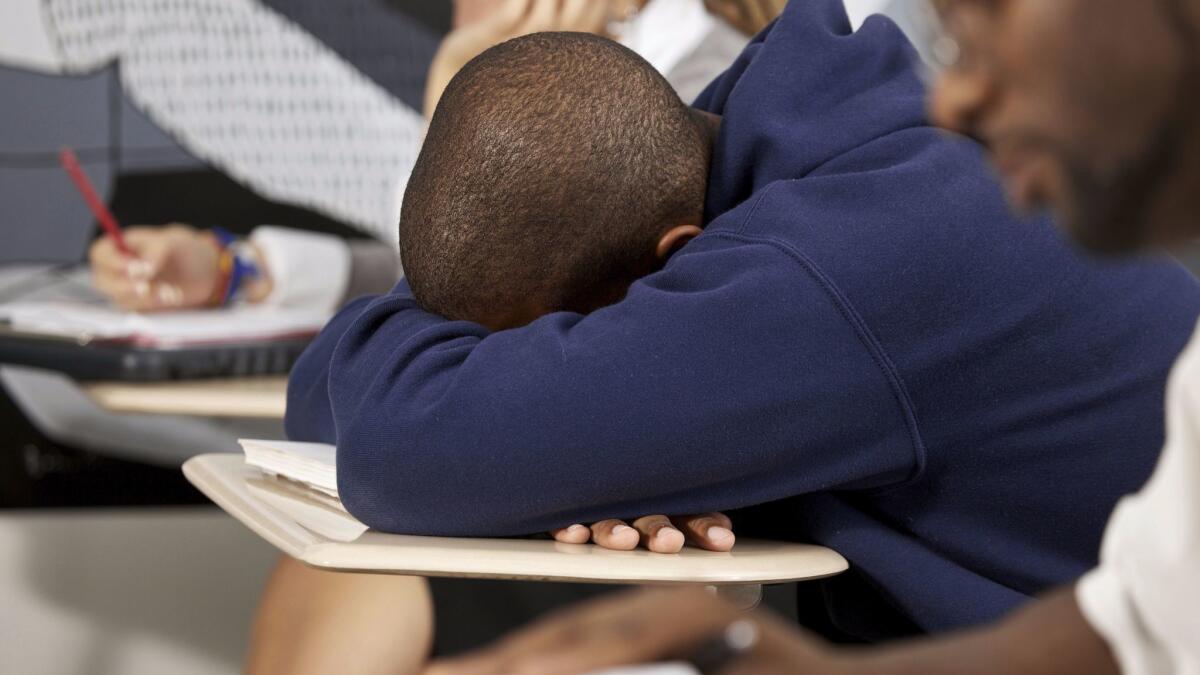Commentary: ‘Sleep education’ must play a role in discussion about school start times

- Share via
Do teenagers know how to sleep? If you’re the parent of a teen, you might be laughing to yourself. That’s all they know how to do. In truth, teens (and their parents) might not know enough about how to sleep, when to sleep and why.
California is considering a bill that would require secondary schools to start no earlier than 8:30 a.m. As a neurologist specializing in sleep medicine, I support the effort to give our state’s teens more time to sleep. But in all the discussions and debates about the economic and health implications of a later school start time, I’ve noticed one very important element is missing: sleep education.
It is one thing to assume that starting school later will lead to more sleep gained, it’s another to give kids and parents the education they need about why sleep is so important, how much sleep teens should be getting and what people of all ages can do to get more and better quality sleep.
Teens require eight to 10 hours of sleep a night, but current school schedules allow for about seven. Critics of the bill question whether starting school later will really contribute to teen’s sleep, or whether it will encourage teens to hit the sack even later. While small, preliminary studies have found that later school start times really do correlate to more sleep, better academic performance and improved health, the concern is not unfounded.
Teens are social creatures, and the most alluring social “gathering” place these days is on their digital devices. Exposure to blue light from our computer screens, TVs and phones have a profound effect on our circadian rhythms, or internal clocks, delaying the onset of sleep. Ideally, we should avoid blue light for at least a half hour before bed. But social media, coupled with homework that requires screen time, means too many kids are powering up their devices when their bodies should be powering down for the night.
If we are going to get serious about giving teens more sleep, we need to educate them – and their parents – about how sleep cycles work.
Just as we focus on our diets and exercise for health, we need to consider sleep as integral to our mental, physical and psychological health. “Good” sleep is sleep that is long enough to allow your brain to remove the toxic proteins that are by-products of daytime neural activity.
Consistent bed times and wakeup times are key to maintaining our sleep cycles. When those are disrupted, our sleep is affected and our brains aren’t given the opportunity to clean house. Over time, poor sleep leads to a decline in cognition, mood and overall health.
Sleep deprivation among teens is such a pressing societal issue, the American Academy of Sleep Medicine addressed it at its annual conference in June. The statistics shared there were startling. For one, sleepy kids are nearly as deadly behind the wheel as drunk ones.
Poor sleep also contributes to a host of medical issues, from obesity to heart disease. Significantly, when I speak to my adult patients who are struggling with sleep issues, nearly all of them say their sleep problems started in high school.
Waking up too early to get to school is only one part of the equation. Equally contributing to sleep issues are going to bed too late, eating too late, taking naps, sleeping in on the weekend and failing to get enough exercise. In other words, these people never learned how to sleep.
So while I support the bill to shift school start times, I think it needs to include an educational component that explains why the shift is occurring. Otherwise, we won’t necessarily solve the health, safety and economic issues of sleepy teens.
We’ll just be hitting the snooze button and dealing with it later.
Dr. JAY PUANGCO specializes in sleep medicine at Hoag Hospital.
All the latest on Orange County from Orange County.
Get our free TimesOC newsletter.
You may occasionally receive promotional content from the Daily Pilot.



